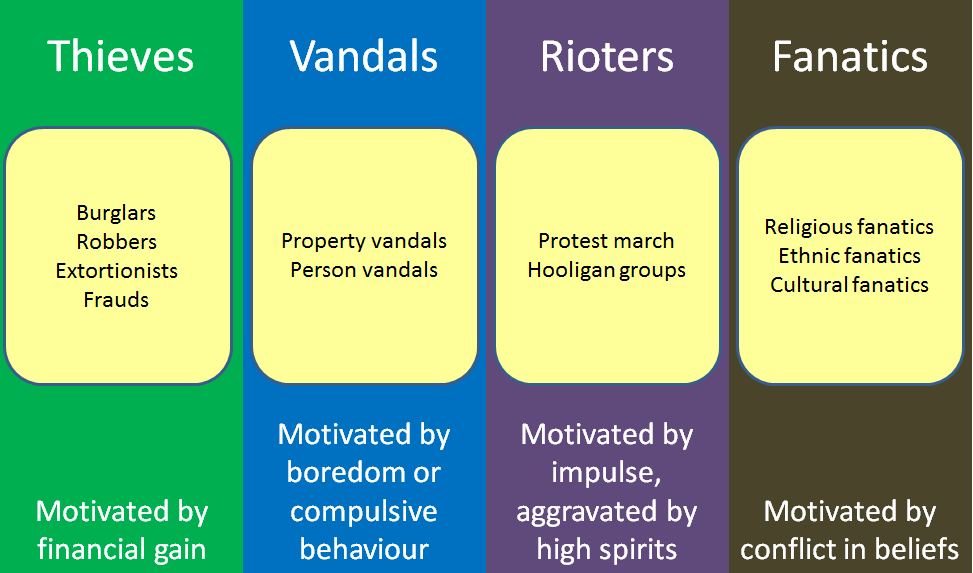Security
Contents
Security
Security is the degree or act of protection of persons or objects against is the opposite of::risk stemming from the threat type reduces::human intent.
Security in the urban environment
Security concerns harm done by persons by wilful action. As these actions are generally prohibited by law, these actions constitute crimes. Security threats can therefore be classified by crime type.
Security threats
A classification that is developed[1] for use in the urban environment that the types of crime most relevant to urban design, is based on the motivation of perpetrators:
The first category of criminals (thieves) is motivated by financial gain. They can be subdivided into:
- Burglars, who gain wealth by illicitly entering buildings,
- Robbers, who gain wealth by force of threat.
- Extortionists, who gain wealth by use of coercion and
- Frauds, who gain wealth by intentional deception
The second category of criminal (vandals) is motivated by amusement (such as bored youth bothering passers-by) or by compulsive behaviour (such as pyromaniacs). They can be sub divided into:
- Property vandals, who seek damage or destruction of property, and
- Person vandals, who assaults other people physically or mentally.
The third category (rioters) is motivated by impulse, often under group pressure, often in a situation with a high level of excitement or arousal. Two subtypes of rioters are:
- Protesters and
- Hooligans.
The fourth and last category is motivated by conflict in beliefs (fanatics) and tries to impose rules or beliefs upon others by use of coercion. The level of coercion can vary a great deal, ranging from mental abuse to mass killing. Subtypes of fanatics are:
- Religious fanatics, who try to impose religious beliefs or religious rules
- Ethnic fanatics, who coerce specific ethnic groups and
- Cultural fanatics, who try to impose cultural beliefs (for example about animal welfare in the fur industry, globalism or conservationism) upon others.
Security as a public good
From the political and public administration point of view, security is often conceived of as a public good. This means in particular that
- it rests on commonly acquired values. Those values can be material (capital, infrastructure, utilities, etc.) or immaterial (security culture, sense of community, etc.)
- it is commonly produced. This includes public-private partnerships as well as citizen participation and ownership (see civic culture);
- nobody should be a priori exempt from its consumption.
It is therefore important to reconcile the idea of security with that of community.[2] This can be done, for example, by including the concept of security culture into concepts for urban planning.
Critics have reprimanded any "clubbing of private security", which in their view contributes to the deconstruction of security as a public good, to the benefit of a short-sighted approach of mere physical risk reduction.[3] This includes scepticism of approaches to urban planning such as the "designing out" approach, as well as any production of security by use of exclusionary practices.[4]
Footnotes and references
- ↑ Developed in the Secure haven project (in Dutch) and adapted for use in the risk assessment tool and this wiki.
- ↑ I. Loader/N. Walker: Civilizing Security. Cambridge et al.: Cambridge University Press, 2007.
- ↑ T. Hope: Crime victimisation and inequality in risk society. In: R. Matthews/J. Pitts: Crime, Disorder and Community Safety. A New Agenda? London/New York: Routledge, 2001, p. 216.
- ↑ G. Hughes: The Politics of Crime and Community. Basingstoke: Palgrave, 2007.
MAP
<websiteFrame> website=http://securipedia.eu/cool/index.php?wiki=securipedia.eu&concept=Security height=1023 width=100% border=0 scroll=auto align=middle </websiteFrame> <headertabs/>
